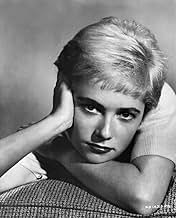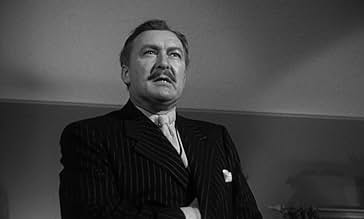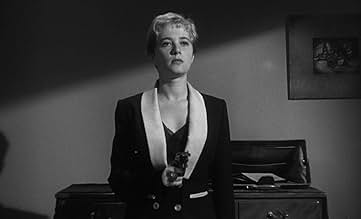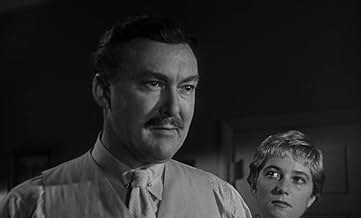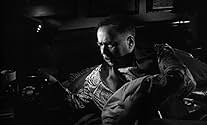A doomed female hitchhiker pulls Mike Hammer into a deadly whirlpool of intrigue, revolving around a mysterious "great whatsit".A doomed female hitchhiker pulls Mike Hammer into a deadly whirlpool of intrigue, revolving around a mysterious "great whatsit".A doomed female hitchhiker pulls Mike Hammer into a deadly whirlpool of intrigue, revolving around a mysterious "great whatsit".
- Director
- Writers
- Stars
- Awards
- 1 win & 1 nomination total
Marian Carr
- Friday
- (as Marion Carr)
Mady Comfort
- Nightclub Singer
- (as Madi Comfort)
- Director
- Writers
- All cast & crew
- Production, box office & more at IMDbPro
Featured reviews
'Kiss Me Deadly' is an overlooked crime gem that has proved to be a major influence on subsequent film makers from the French New Wave to cult classics 'Repo Man' and 'Pulp Fiction'. It's a movie which gets better and better with age. Director Robert Aldrich manages to put lots of style and interesting touches which sometimes border on the surreal into this toughest of tough guy movies. Ralph Meeker ('Paths Of Glory', 'The Dirty Dozen', 'The Anderson Tapes') is well cast as Mickey Spillane's Mike Hammer. Meeker's Hammer is brutal and his performance really makes this one work. The supporting cast are all very good too, especially Albert Dekker ('The Wild Bunch') as Dr Soberin and Maxine Cooper as Hammer's "assistant" Velda. Also keep an eye out for the debut of Cloris Leachman is the striking opening sequence. The "great whatsit" which Hammer searches for is one of the great movie gimmicks, and the ending will blow you away - literally. I loved this movie from beginning to end. I think it ranks alongside 'Out Of The Past' (Tourneur), 'The Asphalt Jungle' (Huston), 'Double Indemnity' (Wilder), 'The Killing' (Kubrick) and 'The Killers (Siegel)' as one of the greatest and most influential American crime movies, and I'm sure Scorcese and Tarantino would be the first to agree. Highly recommended.
Man, I saw this movie for the first time a few years ago and I still don't know what to think about it. Ralph Meeker as a fascistic Mike Hammer, a crazy hitch-hiker, an opera fan and a box that can destroy the world. I dunno.
From what I understand Alderitch (the director) hated Mikey Spillane's story (which was about a briefcase full of drugs or money or something else), thought Mike Hammer was an image of brutality and fascism and made a film that reflected it. He makes Hammer out to be some kind of sadist and makes the suitcase out be some kind of nuclear device. The movie turns from a simple detective story to some wierd-ass, sci-fi cold war parable.
It's sort of like the X-Files meets film-noir PI, or something to that effect.
All that being said, this is a GREAT film and is well worth watching by anyone who like apocalyptic film-noir (in fact, this may be the only film in that sub-genre). Anyone who is a fan of bizarre camera work, weird symbolism and a stranger storyline, should really check this out.
Observe the many bizarre inconsistencies (clocks that jump ahead and back, screams that don't jibe right with the soundtrack, camera angles that jump mysteriously) and keep in mind that these were INTENDED! When you get a feel for this film and start noticing what the director was attempting to do with this bizarre film I think that you will enjoy it even more. Truly a unique piece of film making.
From what I understand Alderitch (the director) hated Mikey Spillane's story (which was about a briefcase full of drugs or money or something else), thought Mike Hammer was an image of brutality and fascism and made a film that reflected it. He makes Hammer out to be some kind of sadist and makes the suitcase out be some kind of nuclear device. The movie turns from a simple detective story to some wierd-ass, sci-fi cold war parable.
It's sort of like the X-Files meets film-noir PI, or something to that effect.
All that being said, this is a GREAT film and is well worth watching by anyone who like apocalyptic film-noir (in fact, this may be the only film in that sub-genre). Anyone who is a fan of bizarre camera work, weird symbolism and a stranger storyline, should really check this out.
Observe the many bizarre inconsistencies (clocks that jump ahead and back, screams that don't jibe right with the soundtrack, camera angles that jump mysteriously) and keep in mind that these were INTENDED! When you get a feel for this film and start noticing what the director was attempting to do with this bizarre film I think that you will enjoy it even more. Truly a unique piece of film making.
No need to recap the plot (even if I could) or echo some of the more obvious details.
Notice how no one stops to help poor Christina as she runs down the street frantically at movie's opening. Instead cars whiz by, until Hammer almost wrecks his snazzy car trying to avoid her. In fact, there's not an overload of compassion anywhere in this brutal noir classic.
As I recall, critics of the time reviled it for the unremitting violence and lack of heroics. At the same time, in years of movie watching, I've never heard screams of pain (e.g. Christina, Sugar Smallhouse) so convincing as here. They're almost too much to bear, which was likely Aldrich's intent. Add to the package a scummy, narcissist PI like Hammer, and you've got a melodrama unlike audiences of the time were prepared for. No wonder the movie bombed. (Two previous Hammer films had also disappointed Spillane fans-- I, The Jury {1953}, The Long Wait {1954})
Except this movie was years ahead of its time in both style and content. Sure, the plot doesn't make much sense. There are threads, but they never seem to come together in coherent fashion. Instead, the money hungry Hammer keeps thrashing around in the dark like there's got to be a big payoff somewhere in the tangle he's got himself into. Self-assured to the hilt, he's not one for self-doubt or moments of contemplation. Instead, he bulls his way through every situation, heedless of what he's getting into. I expect folks looking for deeper meanings find plenty of grist with this. Then too, it's hard to say enough about actor Meeker's spot-on portrayal. His Hammer amounts to a guy you neither like nor dislike, but can't help watching anyway (his physical resemblance to Brando is almost astonishing).
The visual style here is almost equally astonishing. Noir b&w has never been photographed (Earnest Laszlo) more effectively than some of those night scenes (e.g. the brutal fist fight between Hammer and his attacker {Paul Richards}), plus the long, dark hallways and staircases that suggest an enclosed world without redemption. Then too, the exploding beach house is well done, though it goes through 4 or 5 increasingly violent blasts, making Aldrich's apocalyptic point, I guess.
But it's not just Hammer and the thugs he's surrounded with. The women we see may be lovely or even beautiful (Carr), but none are to be trusted. Not even Hammer's Velda (Cooper), who, when you think about it, is his willing partner in the scummy infidelity scams that are his bread and butter. How many husbands, for example, has she seduced into grounds for divorce. It's not obvious, but there's a misogynistic undercurrent running through the narrative, which, I guess, is appropriate for the movie's generally nihilistic attitude. (Note how oblivious Hammer is to the grandeur of the classical music around him that keeps popping up in the screenplay. None of that sublime stuff for him.)
No doubt about it, the movie may retain the raw violence and sex that made author Spillane's potboilers so popular in the 50's. But crucially there's no one to root for here, not even the Hammer of Spillane's Cold War novels who kills commies on sight. No, Aldrich's and screenwriter Bezzerides world is not divided into good and evil, in the way that Spillane's brutal Hammer is redeemed by fighting on the good, patriotic side. Instead, the Aldrich world comes across as a nihilistic one, without enduring values, one that can only be redeemed by apocalypse, nuclear style. No wonder the French glommed onto the film immediately. I'm sure those pessimistic themes fit perfectly with the existentialist topics then so popular among their artistic class.
Anyhow, however you choose to take the 100-minutes—as a betrayal of the novels or as a somewhat profound gloss on the human condition-- the movie remains a memorable one-of- a-kind.
Notice how no one stops to help poor Christina as she runs down the street frantically at movie's opening. Instead cars whiz by, until Hammer almost wrecks his snazzy car trying to avoid her. In fact, there's not an overload of compassion anywhere in this brutal noir classic.
As I recall, critics of the time reviled it for the unremitting violence and lack of heroics. At the same time, in years of movie watching, I've never heard screams of pain (e.g. Christina, Sugar Smallhouse) so convincing as here. They're almost too much to bear, which was likely Aldrich's intent. Add to the package a scummy, narcissist PI like Hammer, and you've got a melodrama unlike audiences of the time were prepared for. No wonder the movie bombed. (Two previous Hammer films had also disappointed Spillane fans-- I, The Jury {1953}, The Long Wait {1954})
Except this movie was years ahead of its time in both style and content. Sure, the plot doesn't make much sense. There are threads, but they never seem to come together in coherent fashion. Instead, the money hungry Hammer keeps thrashing around in the dark like there's got to be a big payoff somewhere in the tangle he's got himself into. Self-assured to the hilt, he's not one for self-doubt or moments of contemplation. Instead, he bulls his way through every situation, heedless of what he's getting into. I expect folks looking for deeper meanings find plenty of grist with this. Then too, it's hard to say enough about actor Meeker's spot-on portrayal. His Hammer amounts to a guy you neither like nor dislike, but can't help watching anyway (his physical resemblance to Brando is almost astonishing).
The visual style here is almost equally astonishing. Noir b&w has never been photographed (Earnest Laszlo) more effectively than some of those night scenes (e.g. the brutal fist fight between Hammer and his attacker {Paul Richards}), plus the long, dark hallways and staircases that suggest an enclosed world without redemption. Then too, the exploding beach house is well done, though it goes through 4 or 5 increasingly violent blasts, making Aldrich's apocalyptic point, I guess.
But it's not just Hammer and the thugs he's surrounded with. The women we see may be lovely or even beautiful (Carr), but none are to be trusted. Not even Hammer's Velda (Cooper), who, when you think about it, is his willing partner in the scummy infidelity scams that are his bread and butter. How many husbands, for example, has she seduced into grounds for divorce. It's not obvious, but there's a misogynistic undercurrent running through the narrative, which, I guess, is appropriate for the movie's generally nihilistic attitude. (Note how oblivious Hammer is to the grandeur of the classical music around him that keeps popping up in the screenplay. None of that sublime stuff for him.)
No doubt about it, the movie may retain the raw violence and sex that made author Spillane's potboilers so popular in the 50's. But crucially there's no one to root for here, not even the Hammer of Spillane's Cold War novels who kills commies on sight. No, Aldrich's and screenwriter Bezzerides world is not divided into good and evil, in the way that Spillane's brutal Hammer is redeemed by fighting on the good, patriotic side. Instead, the Aldrich world comes across as a nihilistic one, without enduring values, one that can only be redeemed by apocalypse, nuclear style. No wonder the French glommed onto the film immediately. I'm sure those pessimistic themes fit perfectly with the existentialist topics then so popular among their artistic class.
Anyhow, however you choose to take the 100-minutes—as a betrayal of the novels or as a somewhat profound gloss on the human condition-- the movie remains a memorable one-of- a-kind.
Robert Aldrich was a no-nonsense film director. When he undertook the direction of this film, little did he know it was going to become the extraordinary movie it turned out to be. The fame seems to have come by its discovery in France, as it usually is the case. Based on Mickey Spillane's novel and adapted by Al Bezzerides, the movie has an unique style and it's recommended viewing for fans of the film noir genre.
Right from the start, the film gets our imagination as we watch a young woman running along a California highway. That sequence proved Mr. Aldrich's ability to convey the idea of a disturbed young woman that seems to have escaped from a mental institution. The plot complicates itself as Hammer learns that Christine, the young woman, has died. He decides to investigate, which is what he does best.
Some excellent comments have been submitted to this forum, so we will not even try to expand in the action but will only emphasize in the tremendous visual style Mr. Aldrich added to the film, which seems to be its main attraction. For a fifty year old film, it still has a crisp look to it thanks to the impressive black and white cinematography of Ernest Lazlo, who had a keen eye to show us Hammer's world as he makes it come alive. The great musical score by Frank DeVol fits perfectly with the atmosphere of the L.A. of the fifties.
Ralph Meeker made an excellent contribution as Mike Hammer. He dominates the film with his presence. Albert Decker, Paul Stewart, Miriam Carr, Maxine Cooper, Fortuno Bonanova, and especially Cloris Leachman, in her screen debut, make this film the favorite it has become.
Fans of the genre can thank Mr. Aldrich for making a film that didn't pretend to be anything, yet has stayed as a favorite all these years.
Right from the start, the film gets our imagination as we watch a young woman running along a California highway. That sequence proved Mr. Aldrich's ability to convey the idea of a disturbed young woman that seems to have escaped from a mental institution. The plot complicates itself as Hammer learns that Christine, the young woman, has died. He decides to investigate, which is what he does best.
Some excellent comments have been submitted to this forum, so we will not even try to expand in the action but will only emphasize in the tremendous visual style Mr. Aldrich added to the film, which seems to be its main attraction. For a fifty year old film, it still has a crisp look to it thanks to the impressive black and white cinematography of Ernest Lazlo, who had a keen eye to show us Hammer's world as he makes it come alive. The great musical score by Frank DeVol fits perfectly with the atmosphere of the L.A. of the fifties.
Ralph Meeker made an excellent contribution as Mike Hammer. He dominates the film with his presence. Albert Decker, Paul Stewart, Miriam Carr, Maxine Cooper, Fortuno Bonanova, and especially Cloris Leachman, in her screen debut, make this film the favorite it has become.
Fans of the genre can thank Mr. Aldrich for making a film that didn't pretend to be anything, yet has stayed as a favorite all these years.
So the big what'sit is what it's all about and this big what'sit is without a doubt, flat out phenomenal. Ralph Meeker snarls and sneers his way thru a bevy of sadism and selfishness in this superb, unflinching look at amorality beneath happy go lucky 50's sensibilities. Biting and wicked and never dull, and filled with more amazing characters than one movie deserves, this is a knock out classic that you will enjoy wallowing in repeatedly.
Did you know
- TriviaThe Kefauver Commission, a federal unit dedicated to investigating corrupting influences in the 1950s, singled this out as 1955's number one menace to American youth. Because of this, Robert Aldrich felt compelled to conduct a writing campaign for the free speech rights of independent filmmakers.
- GoofsAt the beginning, Christina (Cloris Leachman) is shown running at the side of the highway, but the shots of only her feet show her running along the painted center line of the highway.
- Quotes
Mike Hammer: You're never around when I need you.
Velda: You never need me when I'm around.
- Crazy creditsThe opening credits scroll down instead of the usual up, resulting in needing to read them bottom to top.
- Alternate versionsUntil 1997, all known copies in circulation of "Kiss Me Deadly" ended rather abruptly: the wounded Mike Hammer stumbling through the beach house looking for his partner Velda, and then there's a couple of brief shots of the house exploding and burning, with "The End" superimposed on the final shot. The music is cut off instead of fading out, and the screen turns black; it looks like Mike and Velda died in the blaze.
- ConnectionsEdited into American Cinema: Film Noir (1995)
- SoundtracksRather Have the Blues
Sung by Nat 'King' Cole
Written by Frank De Vol (uncredited)
[Played on the car radio during the opening title card and credits]
Details
- Release date
- Country of origin
- Languages
- Also known as
- El beso mortal
- Filming locations
- Clay Street, Bunker Hill, Downtown, Los Angeles, California, USA(Mike parks his Corvette and takes the back steps up to the Hillcrest Hotel)
- Production company
- See more company credits at IMDbPro
Box office
- Budget
- $410,000 (estimated)
- Gross US & Canada
- $726,000
- Gross worldwide
- $952,000
- Runtime
- 1h 46m(106 min)
- Color
- Aspect ratio
- 1.85 : 1
Contribute to this page
Suggest an edit or add missing content



